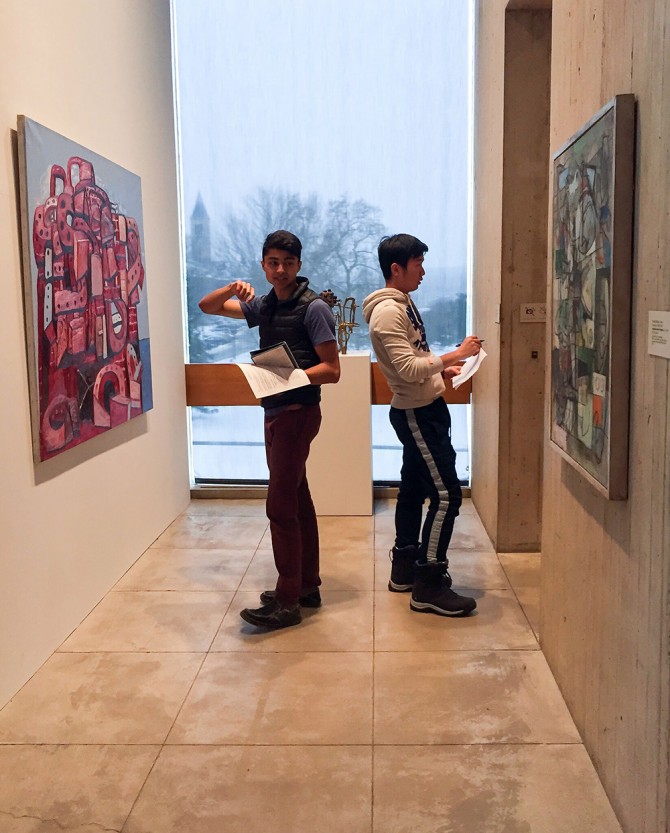Arts and Sciences names 2019 College Scholars
By Yvette Lisa Ndlovu
What is the likelihood of a universal language emerging some day? How can mathematical models help us understand how humans operate in society? Under what conditions can communities recover socially, economically and psychologically after having experienced a major conflict?
These are some of the questions that the new group of College Scholars in the College of Arts and Sciences are trying to uncover in their research.
“The College Scholar Program is the pinnacle of the liberal arts experience at Cornell,” said Michael Goldstein, program director and associate professor of psychology. “It is important because it allows students to leverage all of the expertise across all the departments in the College of Arts and Sciences and beyond to produce the most innovative and interesting research.”
The College Scholar Program is designed for students who are passionately focused on a particular type of problem, issue or singular aspect of a larger field. College Scholars explore subjects with a broader integration of related disciplines, develop a focused aspect of an interdisciplinary field or pursue a subject in which they are unusually advanced.
Students apply during the first semester of their sophomore year. While College Scholars are not required to complete college distribution requirements, they are required to complete a senior project or honors thesis during their final year.
Goldstein works with a faculty committee to select the new College Scholars and assign their faculty mentors, who work with the students to develop their own research ideas. This semester, Goldstein is leading incoming scholars in a new seminar, which serves as an interdisciplinary research methods course.
“The program allows students to take responsibility for their intellectual development,” Goldstein said. “We have students who have interests in a broad range of subjects, from the visual arts to physics. This group of students are really inspiring to work with. I’ve been learning a lot from them about how different fields conceive of data, how different fields define truth.”
Jim Finlay, program coordinator and advising dean, helps Goldstein advise and mentor the College Scholars.
In the weekly seminar, students explore a variety of ways to approach research. For example, they recently undertook a visual literacy activity at the Herbert F. Johnson Museum of Art where they paired up and took turns describing an artwork to a student facing away from the work. The student who couldn’t see the artwork had to then draw what their peer was describing. After the activity, students talked about how word choices matter, and how an individual’s biases toward a given image are communicated.
Class of 2021 College Scholars and projects:
- Micaela Carroll: Patterns: The Key to Learning Language & Movement;
- Timothy Chue: Reasoning, Consciousness and Artificial Intelligence;
- Emma DiGiovanni: An Interdisciplinary Study of Animal-Human Interactions;
- Anekha Goyal: Explorations into Decision-Making to Counter Inequity in Health Care Policy;
- Anna Lifsec: The Potential Impact of Education on Incarceration and Recidivism in the United States in the Era of Mass Incarceration;
- Hannah Marks: Exploring Links Between Gender, Inequality, Technology and Business;
- Victor Odouard: Mathematical Modeling of a Functioning Human Society;
- Katherine Pyne-Jaeger: The Underworld of Women’s Vocality in Contemporary Mythological Literature;
- Samuel Ryb: Language Without Borders: What is the Likelihood of a Universal Language Emerging?
- Sarah Sachar: Reality/Surreality: Conceptualizing Reality through the Lens of the Avant-Garde;
- Sarah Skinner: Understanding Understanding: Empathy, Text and Media through the Lens of Cognitive Science;
- Milo Vella: Comparative Philosophies of Land Use: the Ideologies Underlying Interaction with Place;
- Victoria Watson: State-and-Nation Building in Post-Conflict Societies;
- Sterling Williams-Ceci: Changing Times: Benefits and Challenges of Growing up in the Digital Era.
Yvette Lisa Ndlovu is a communications assistant for the College of Arts and Sciences.
Media Contact
Get Cornell news delivered right to your inbox.
Subscribe

